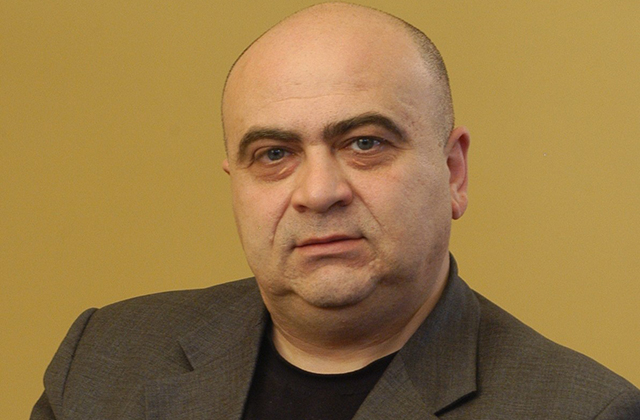Violence shouldn’t become a norm of relations between the leadership and the society: Tigran Hakobyan

It’s been a few months that the agenda of information flow also dictates the topic of “Sasna Tsrer.” Public attention won’t fade towards the July dramatic developments, even against the background of other rather crucial developments. Why operations of the armed group didn’t have unequivocal assessment? What is frequent justification of political violence conditioned by? What’s the difference between an armed attack and terrorism? “168 Hours” interviewed Tigran Hakobyan, member of the National Commission on Television and Radio, president of “Society against Terrorism” NGO, to find answers to the abovementioned questions.
Public sharp debates around July drama won’t stop. Were they heroes or criminals? Are those methods of fight accepted or ignored? Is it possible to solve issues of our country through armed rebellion? We seem not to have a definite answer acceptable by everyone.
Firstly, the society hasn’t yet answers to a number of questions: how it turned out that a large armed group succeeded to seize the police precinct in the capital? Who have murdered the three policemen? Which are real (and not declared) reasons for the attack? Do those operations have principals?
Maybe we’ll have answers to some questions during the proceedings. Secondly, a few of ideologists and participants of the armed group are public figures, whose methods of struggle are acceptable to some part of the society. With the help of the media, the topic of “Sasna Tsrer” is skillfully kept in the center of attention—regularly new informative events are being established. For instance, one of the arrested nominates his candidacy in local self-government elections, flash mobs are being held for treating the leg of one of the wounded members, an absurd document is being issued, elaborated by “Sasna Tsrer” and “Founding Parliament” entitled “A road map and Constitutional provisions.” We should take into consideration that a wider part of the citizens doesn’t consider the institute of elections a way to change the leadership, and relies only on another “saviors.” Thus, reasons for constant discussions on those developments are many, let me not enumerate them all.
But the document you qualify as absurd is a road map of political and economic radical changes in the country.
Yes, our country strictly needs radical changes. However, look what Sefilian and his supporters propose in that road map. They call present Armenia an “anti-state,” a “non-state,” legal grounds for which aren’t legitimate (i.e. they consider 25 year-old history of Armenia as nothing). They deny elections as the main institute for the state and democracy. They are going to lead the country through the Council consisted of a few persons (i.e. junta).
The Government developed by them “will first and foremost suspend the process of charging for irrigation water, red lines, traffic fines and penalties, small business taxes, as well as will forgive money not paid for them” (i.e. in the civilized world they propose long ago denied models of “military communism,” economic anarchy). They are going to generate “a native state meant for provision of human happiness” (this isn’t possible to comment: last time development of happy society middle-age utopists promised in their works).
Let me not continue. Through likewise archaic anti-economic and anti-political approaches it’s impossible to build a competitive, powerful country. Just the contrary, carriers of likewise view of the state destroy the foundations after seizing the leadership.
In July you qualified seizure of the police precinct as terror, and drew parallel lines with October 27. However, both the opposition and the authorities, seemed to avoid from such assessments. Some figures even blamed you for sharpening the situation, providing the authorities a reason for implementation of force towards the armed group members. What was the reason for your tough assessments?
My modest possibilities or intention to orientate activities of the authorities were too exaggerated. I didn’t define legal restrictions of terrorism, and pursuant those definitions, the occurrence, let me repeat, wasn’t terror. It’s another issue that the authorities, several political powers and figures were avoiding to qualify the occurrence as terror out of various reasons. In case of the authorities, I think, the reason was lack of trust towards them, the intention of avoiding tough measures by the authorities and solving the issue through negotiations (after March 1 it’s difficult to assume the responsibility of hard power solutions).
Political powers were doing their calculations, attempting to gain dividends. Reflection of a considerable part was also clear, by that people were expressing their discontent from the situation in the country, also attempting to prevent the anticipated bloodshed. It was the main reason that the citizens were gathering near the seized police precinct. The majority of the people gathered didn’t share methods of struggle of the armed people, however, they intended to save lives of the young people. We shouldn’t forget either that our society tends to justify political violence, if such are implemented against “nation’s enemies” by their “national heroes.”
Reasons in our history are numerous. In particular, political violence by Armenians for decades has been directed to organizers of the Armenian Genocide, Turkish officials, and it was observed as revenge, restoration of justice. The so-called “ethnic terror” implemented by ASALA and other organizations comprised a component of national-liberation struggle, one of the purposes of which was keeping the Armenian Cause in the center of the world’s attention. But look what turned out then: members of “Dro,” “October 27” and “Sasna Tsrer” were also Armenians, however, purpose of the armed struggle was already settlement of Armenia’s domestic issues, and targets—their own country and citizens of that country. And this transformation was ignored by the elite, old stereotypes didn’t allow and comprehend the threat of moving the term “national liberation movement” to the interstate field, calling citizen of your country a nation’s enemy.
However, on March 1 as well target of violence was the citizen of your country, and as a result of brute force we had numerous victims and wounded people.
Yes, it was also impermissible. “March 1” left an irreversible track in our memory, consciousness, raised a powerful wave of anger, it wasn’t forgiven. I wonder, when numerous figures condemning the slaughter of March 1, attempt to justify activities of “Sasna Tsrer.” However, the most ridiculous is that the most enthusiastic protectors are members of a political power seemingly bearing liberation values. It’s crime, when the state uses force towards its own citizens. And the issue is that the citizens should fight against use of violence by the state, and not make violence a norm of relations between the authorities and the opposition, the state and the society.
I’m really sorry, that numerous political and social figures don’t realize classical truth. And if they don’t understand, what should we expect from an ordinary citizen? It’s absolute truth for me that freedom in your own country isn’t established through force, hatred, bloodshed.
We are used to considering terrorism actions with distinguished cruelty—blasting and shooting in crowded places, like we saw in New York, Paris, Iraq, Pakistan, dozens of other countries. In July, the situation seemed to be different, people protested against injustice in the country. So, why terror and not rebellion, why terrorists and not rebels?
These very manipulative tricks are used to mislead people—criminals are declared heroes, adventurism of small groups—uprising. We may use the word “rebel,” but it doesn’t change anything. FARC militants in Columbia, fundamentalists of Boko Haram in Nigeria, members of Tamil Ealam in Sri Lanka, members of armed groups in dozens of countries are called rebels. Purposes declared by them all is building social justice, granting happiness to each citizen. However, as a result of their struggle—hundreds and thousands of victims, intolerance, destroyed economy.
Let me remind that for the first time Jirair Sefilian (he was coordinator of the “Alliance of Armenian Volunteers” then) was arrested 10 years ago—in December 2006 for his speeches in some conference. At that time I gave an interview to your newspaper. In particular, I stated that calls for violence sooner or later lead to bloodshed if likewise calls don’t receive respective assessment and counteraction. At that time again I was set in the pillory. 10 years later we had armed attack, destabilization of the situation, mutual force, dozens of wounded and three killed Armenian citizens.
There is no any other means for regime change, than political struggle. Democratic clashes are only possible peacefully, it’s desirable—through elections, no matter how unfair and vulgar elections they may be today. If it doesn’t succeed through elections, there are other ways of struggle—civil disobedience, demonstrations, other ways of exerting pressure over the authorities. But not weapon, blood, force.
Those “devotees” armed with bloody revolt can’t overcome ongoing political and economic crisis. It’s been stated and proven for thousand times with the example of different countries—democracy isn’t established through the weapon. There are no likewise examples. The one coming to power through the weapon and force will defend his leadership to complete the “mission” of reaching happiness. He will defend from more “devotees,” who excited by the precedent, will attempt to fail the authorities, which became criminals the next day they came to power.
By Armine Vardanyan

























